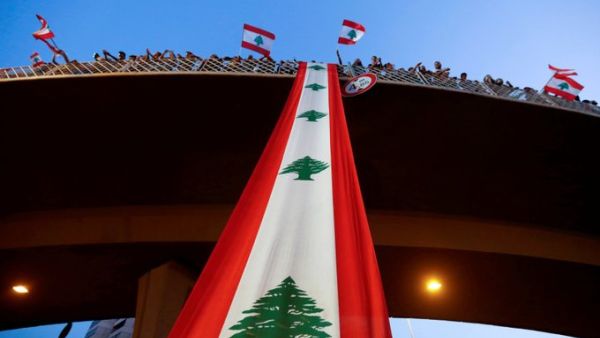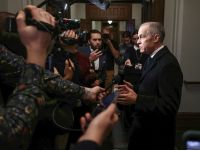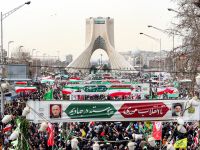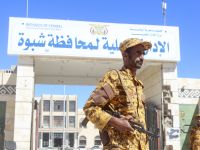Lebanon faces the risk of a prolonged Cabinet standoff, with all the grave consequences this entails for the country’s struggling economy, if a special French envoy fails in his talks with Lebanese political leaders to make a breakthrough in the stalled government formation process, political sources said Wednesday.
Patrick Durel, an adviser to French President Emmanuel Macron for Middle East and North Africa affairs, arrived in Beirut Wednesday night on a two-day visit for talks with rival Lebanese leaders aimed at reviving the French initiative to rescue the crises-stricken country and accelerating the formation of a new government to deliver urgent reforms.
“In the face of the parties’ conflicting positions and horse-trading for key ministerial posts that have stalled the Cabinet formation, hopes are pinned on the French envoy’s mission to try to nudge rival leaders into agreeing on the formation of a mission government to enact essential reforms in line with the French initiative,” a political source familiar with the Cabinet formation process told The Daily Star.
“Implementation of reforms is essential to reverse the economic and financial meltdown that is threatening the country’s security and stability,” the source said.
“But if the French envoy fails to make any progress in his talks with Lebanese politicians on the Cabinet crisis, this will heighten fears of the country drifting into a prolonged power vacuum, with all the adverse effects this carries for the country’s ailing economy and stability,” the source added.
Durel is expected to meet Thursday and Friday separately with President Michel Aoun, Parliament Speaker Nabih Berri, caretaker Prime Minister Hassan Diab, Prime Minister-designate Saad Hariri, Progressive Socialist Party leader Walid Joumblatt and Lebanese Forces head Samir Geagea. It is not yet known whether Durel would also meet with any Hezbollah official.
The French envoy’s visit comes as Hariri’s attempts to form a new government of nonpartisan specialists to enact reforms, already stymied by rival factions’ jockeying for key ministerial posts, are facing new complications following last week’s imposition of US sanctions on Free Patriotic Movement leader MP Gebran Bassil over corruption charges and his ties to Hezbollah, long labeled a terrorist organization by Washington.
The US sanctions on Bassil, who heads the FPM’s 24-member Strong Lebanon bloc, the largest bloc in Parliament, threatened to bring the Cabinet formation process back to square one after Bassil responded to the sanctions by hardening his stance and setting conditions for the formation that run counter to Hariri’s proposed 18-member Cabinet of specialists.
A political source told The Daily Star Tuesday that the French envoy’s visit was aimed at “reviving the French initiative, helping to overcome obstacles facing the Cabinet formation and urging Lebanese leaders to hasten the formation of a mission government to carry out the reform program agreed upon by Lebanese leaders during their meeting with President Macron at the Pine Palace.”
He was referring to Macron’s meeting with Lebanese leaders at the French ambassador’s residence in Beirut on Sept. 1, when Macron presented a French road map to save Lebanon from a series of multiple crises, compounded by the August deadly explosion that pulverized Beirut Port and destroyed half of the capital.
The daily Nidaa al-Watan Wednesday quoted a French presidency official as saying that Macron still expected Lebanese officials to “ensure the necessary conditions to help Lebanon by forming a government made up of ministers, who are trustworthy with their integrity and competence to receive financial aid and loans and also to carry out a forensic audit in the Central Bank’s [accounts].”
Asked if the US sanctions on Bassil would obstruct the Cabinet formation, the French official said: “These sanctions must not obstruct the Cabinet formation because Lebanon needs a government under the conditions set by the French presidency to bring Lebanon out of its crisis.”
Joumblatt, whose PSP’s parliamentary bloc had nominated Hariri for the premiership, Wednesday met with Berri, discussing the Cabinet formation crisis ahead of the French envoy’s visit. Contrary to custom, Joumblatt did not speak to reporters after the meeting with Berri held at his Ain al-Tineh residence. Both Berri and Joumblatt supported the French initiative.
Since his designation to form a new government on Oct. 22, Hariri has held a series of meetings with Aoun to speed up the Cabinet formation. The two leaders have agreed on an 18-member Cabinet of specialists and the rotation of the remaining three so-called “sovereign ministries” – Defense, Interior and Foreign Affairs – and are currently working to distribute ministerial portfolios among the various sects. The latest complications appeared to have prevented Hariri from presenting Aoun with his first draft Cabinet lineup.
“What is holding up the Cabinet formation are persisting differences over the parties’ competition for public-services related ministries, such as the health, public works, telecommunications, education and social affairs portfolios,” another political source close to the Cabinet formation efforts told The Daily Star Wednesday.
Aoun and the FPM were also reported to be seeking to control three key ministries: Interior, Defense and Justice.
The source said Hariri’s insistence on naming some of the Christian ministers in the next government and Aoun’s refusal to this matter are “posing another hurdle to the formation process.”
With the Lebanese Forces and the Kataeb Party having decided to stay out of the next government, key and low-ranking ministerial portfolios allotted to the Christian sect will have to be divided among the president’s share, the FPM and the Marada Movement headed by Sleiman Frangieh. Frangieh was reported to be seeking either one of the three remaining “sovereign ministries” or two public services-related portfolios.
The issue of the Finance Ministry, the fourth sovereign ministry, had already been settled after Hariri earlier said he agreed to assigning it to the Shiite sect only for one time – a major demand of the two main Shiite groups, the Amal Movement and Hezbollah.
The Higher Islamic Council, which met under Grand Mufti Sheikh Abdel-Latif Derian, criticized the delay in the Cabinet formation. “The council expressed surprise over the continued obstruction of Prime Minister-designate Saad Hariri’s efforts to form a new government that will work to save Lebanon from its suffocating crisis and bring it out of the circle of political vacuum,” said a statement after the meeting held at Dar al-Fatwa.
“Lebanon is in dire need for a national rescue government that is up to the level of challenges facing it,” it added.
Hariri, backed by France and regional powers, is struggling to form a new government of nonpartisan specialists who would be tasked with enacting a series of structural economic and administrative reforms spelled out in the French initiative designed to lift the country out of its catastrophic economic and financial crunch, the worst since the 1975-90 Civil War.
This article has been adapted from its original source.








